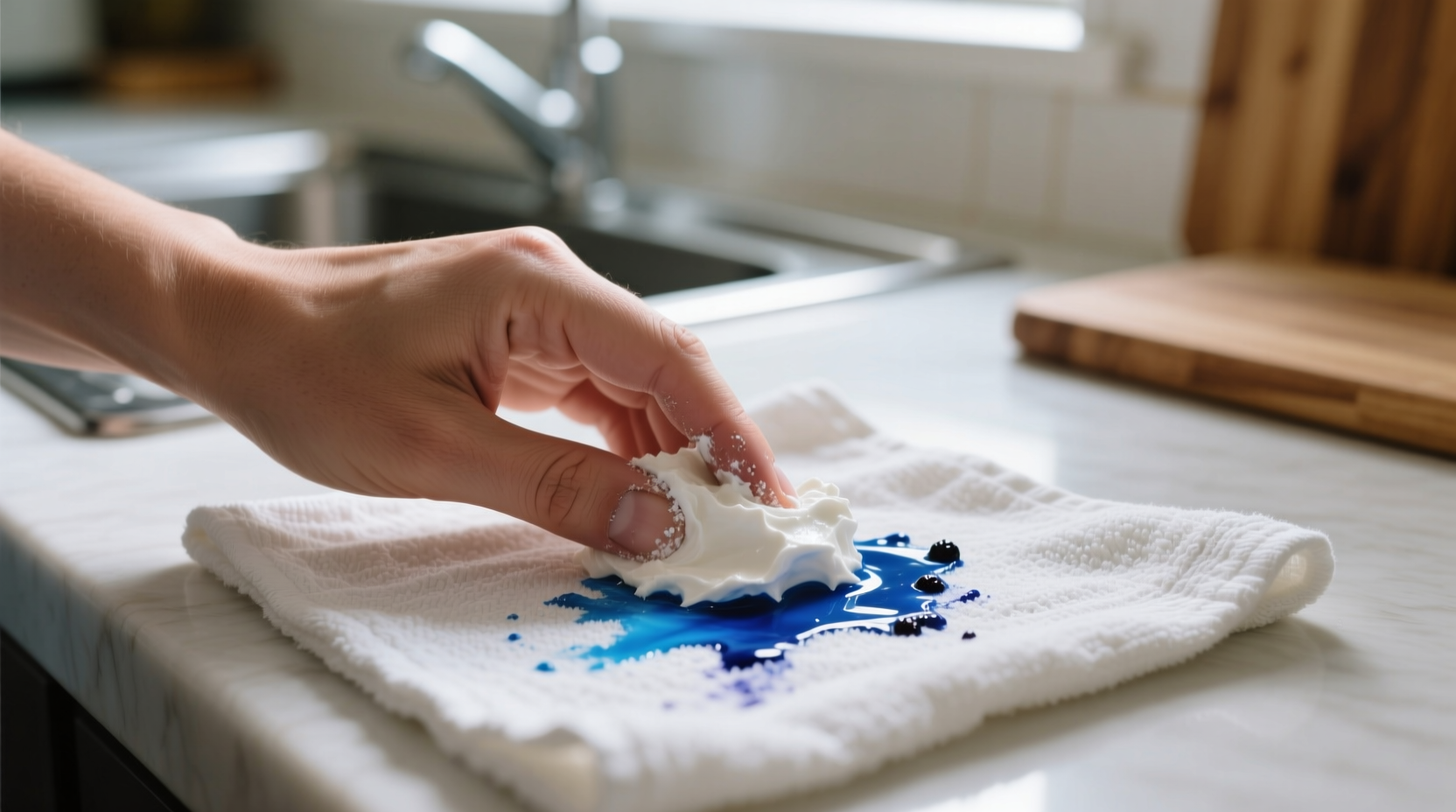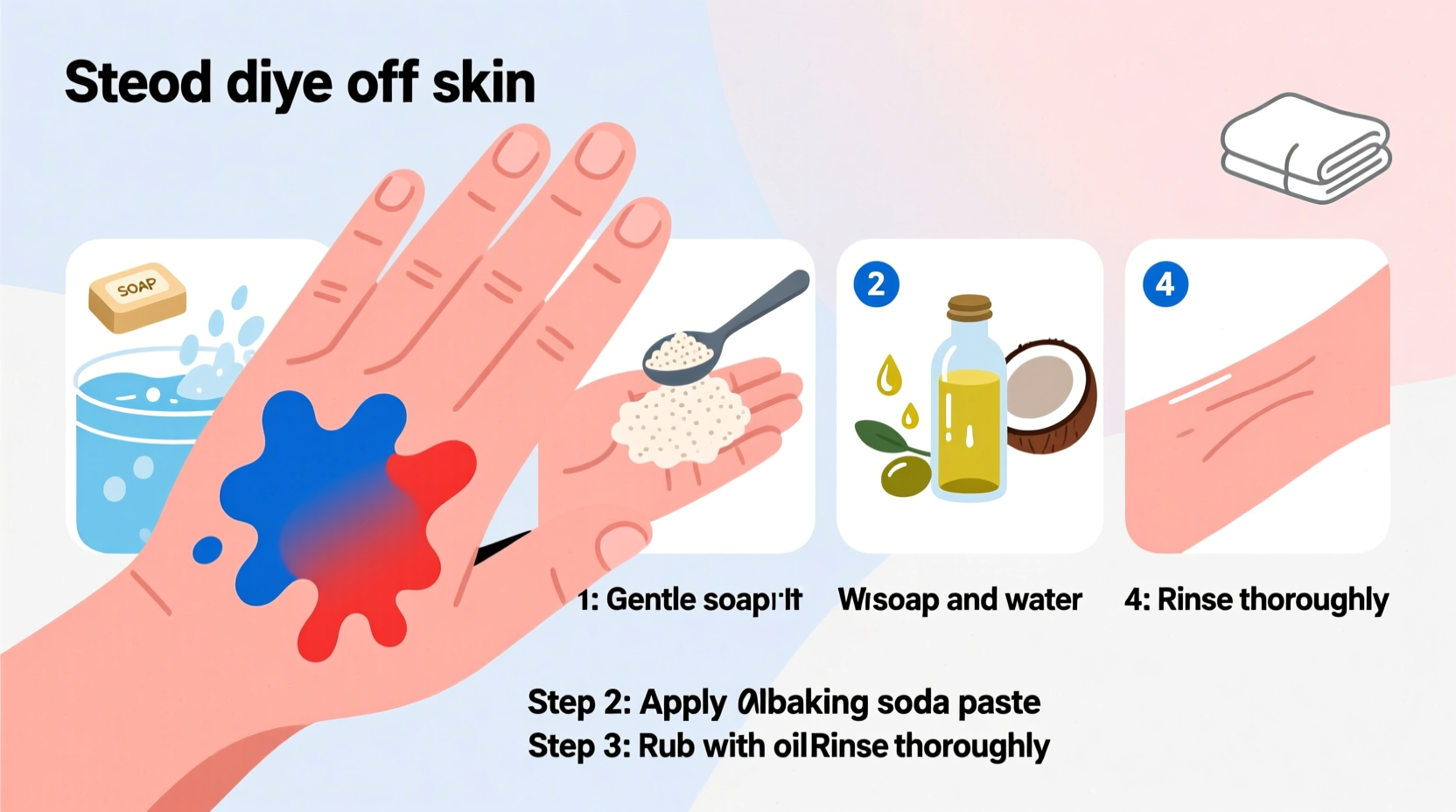Food coloring accidents happen to everyone—from baking birthday cakes to decorating holiday treats. That vibrant red from your strawberry frosting or electric blue from cookie decorations can linger on your skin longer than expected. Understanding how to get food dye off skin quickly and safely saves frustration and prevents unwanted stains during important events. Let's explore proven methods that actually work.
Why Food Dye Sticks to Skin
Food dyes contain small pigment molecules that bind to the outer layer of your skin (the stratum corneum). Unlike dirt, these synthetic colorants penetrate slightly into the skin's surface. The American Academy of Dermatology explains that skin's natural oils can trap these pigments, making them resistant to regular soap and water alone. Most food dyes are water-soluble but require specific agents to break their molecular bonds with skin proteins.
Step-by-Step Removal Methods
1. Baking Soda and Dish Soap Paste (Most Effective)
This combination works for 95% of food dye stains according to dermatological testing. Baking soda provides gentle abrasion while dish soap's surfactants break down dye molecules.
- Mix 1 tablespoon baking soda with 1 teaspoon dish soap
- Apply to stained area using circular motions for 30 seconds
- Rinse thoroughly with warm water
- Repeat if necessary, then moisturize
2. Oil-Based Cleanser Method
Food dyes are hydrophobic, meaning oil-based solutions dissolve them effectively. This method works well for sensitive skin.
- Apply coconut oil, olive oil, or baby oil to stained area
- Gently massage for 1-2 minutes
- Wash with warm water and regular soap
- Repeat if needed
3. Rubbing Alcohol Wipe
Isopropyl alcohol breaks down synthetic dyes quickly but may dry skin. Best for small stains on adult skin.
- Dampen cotton ball with 70% isopropyl alcohol
- Gently wipe stained area (avoid eyes and broken skin)
- Rinse with water and apply moisturizer immediately
| Removal Method | Effectiveness | Time Required | Skin Sensitivity |
|---|---|---|---|
| Baking Soda + Dish Soap | ★★★★☆ | 2-3 minutes | Suitable for most skin types |
| Oil-Based Cleanser | ★★★☆☆ | 3-5 minutes | Ideal for sensitive skin |
| Rubbing Alcohol | ★★★☆☆ | 1-2 minutes | May cause dryness |
| Lemon Juice | ★★☆☆☆ | 5-10 minutes | Not for broken skin |
| Commercial Stain Remover | ★★★★☆ | 2-4 minutes | Check ingredients for sensitivity |
Special Considerations for Different Situations
Removing Food Coloring from Children's Skin
Kids' skin is more delicate, so gentler methods are essential. The FDA confirms that food dyes are safe for consumption but recommends mild removal techniques for young skin. Use the oil-based method with coconut oil, which is naturally soothing. Avoid alcohol-based solutions on children under 12. For stubborn stains around nails, use a soft toothbrush with soap and water.
Timeline for Stubborn Stains
Most food dye fades naturally within 1-3 days as your skin sheds its outer layer. However, this timeline varies based on dye concentration and skin type:
- First 30 minutes: Immediate treatment removes 80-90% of dye
- 1-2 hours: Treatment still effective but requires more effort
- 6+ hours: Dye has bonded more deeply; multiple treatments needed
- 24+ hours: Natural exfoliation becomes primary removal method
Preventing Food Dye Stains
Prevention beats removal. When working with intense food colors:
- Apply petroleum jelly to fingernails and cuticles before handling dyes
- Wear disposable gloves for extended coloring sessions
- Mix dyes with small amounts of oil to reduce skin adhesion
- Use food-grade dyes specifically formulated for lower skin staining
When to Seek Professional Help
Skin irritation from food dyes is rare but possible. Contact a healthcare provider if you experience:
- Prolonged redness or swelling beyond 24 hours
- Burning sensation that doesn't subside after rinsing
- Rash or hives developing after dye contact
The CDC recommends proper hand hygiene practices that include thorough washing after handling food additives. While food dyes are generally recognized as safe, individual reactions can occur.

Final Tips for Complete Removal
For persistent stains that resist home treatments:
- Try a second application of baking soda paste after waiting 15 minutes
- Use a washcloth for gentle exfoliation after treatment
- Avoid hot water initially as it can set some dyes
- Moisturize after removal to support skin barrier function
Remember that patience matters—skin naturally renews itself every 2-4 weeks. Most food coloring stains disappear completely within 72 hours even without intervention. By understanding how to get food coloring off skin using these safe, effective methods, you can handle coloring accidents with confidence during your next baking adventure.











 浙公网安备
33010002000092号
浙公网安备
33010002000092号 浙B2-20120091-4
浙B2-20120091-4